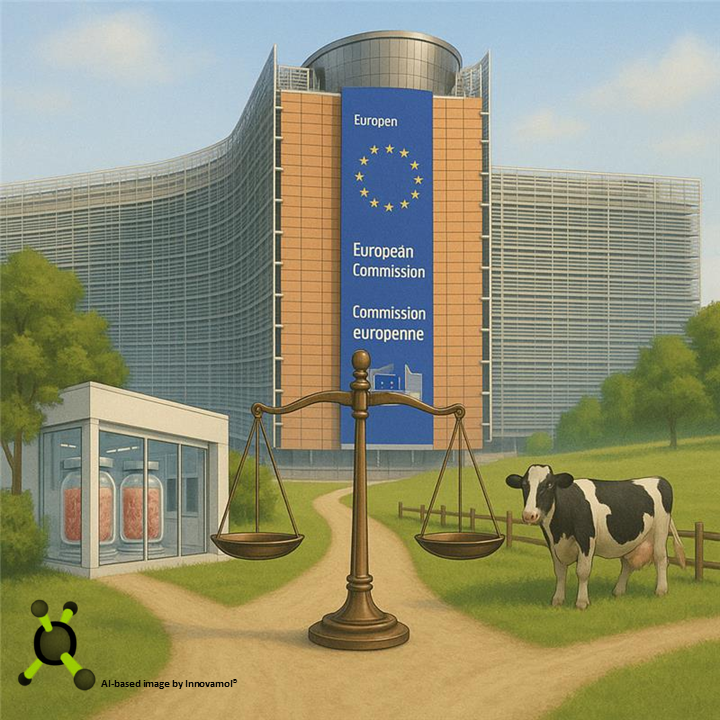We Innovamol insist on cultivated meat, but today we would like to see the “legal” problem. In fact, the future of cultivated meat may be influenced more by regulation than by science as it gets closer to the market. Even though bioreactors and cell cultures have made headlines, what ends up on European plates (but also in other countries) will ultimately be decided by the silent machinery of regulation, trade law, and political discussion. In this way, cultivated meat is a test case for how European institutions respond to disruption rather than merely a technological advancement.
The Novel Foods Regulation (EU 2015/2283) currently governs cultivated meat within the European Union. This category includes any product that was not widely used prior to May 1997 and is subject to a centralised authorisation procedure. The European Commission receives applications, which are then examined for risk by the European Food Safety Authority (EFSA) and, if approved, added to the EU’s official list of approved novel foods. The purpose of this system is to guarantee uniformity, safety, and transparency throughout the internal market (https://food.ec.europa.eu/safety/novel-food_en).
Political and legal challenges are emerging even before cultivated meat reaches store shelves. In 2023, Italy passed a national law banning the production and sale of cultivated meat. Even before its formal adoption, the measure was already causing significant disruption, affecting not only businesses directly involved in the sector but also related industries such as traditional agriculture and livestock farming. Investors lingered from negotiations, and the persistence of a restrictive political stance has positioned Italy as a high-risk environment for economic initiatives, undermining its ability to attract capital and support the development of enterprises and the sector’s Made in Italy identity.
Worsening the legal uncertainties, the European Commission officially closed the TRIS (Technical Regulation Information System) procedure regarding Italy’s national law banning cultivated meat and restricting meat-related terms for plant-based products. This happened because Italy bypassed EU rules by adopting the law before the end of the standstill period, breaching procedural obligations under Directive (EU) 2015/1535. According to the Commission and consistent with the case law of the Court of Justice of the EU, such a violation may render the law unenforceable before national courts. The Italian government’s premature withdrawal from the TRIS process prevented other Member States and the Commission from completing their review and raising formal objections—despite concerns already raised, including a detailed opinion from Lithuania. The case highlights how national decisions taken outside EU procedural frameworks can threaten regulatory coherence and internal market functioning.
Meanwhile, Hungary has notified a similar draft law under the TRIS procedure (Notification 2024/0394/HU), proposing a national ban on the production and marketing of cultivated meat. This time, the procedure is being respected, and the draft has already received comments from several Member States (including the Netherlands, Sweden, Denmark, and Czechia) and detailed opinions from Lithuania, Austria, and the European Commission. Unlike Italy’s case, this approach demonstrates that even restrictive national measures can be subject to scrutiny—ensuring transparency, proportionality, and compatibility with EU law.
Beyond Europe, similar tensions are playing out. For instance, Florida’s 2024 ban on lab-grown meat triggered a legal confrontation between state and federal authorities. At the heart of these cases lies the same fundamental question: can governments restrict access to a product that hasn’t yet been authorised or placed on the market, purely on the basis of principle or protectionism?
In the European context, the Italian ban appears to clash with two core principles: the EU’s exclusive competence to authorise novel foods, and the free movement of goods as enshrined in Article 34 of the Treaty on the Functioning of the European Union. While member states can raise concerns during the EU approval process, they cannot unilaterally block the sale of a product once it has been authorised at the European level. Legal experts argue that such national bans, if challenged before the European Court of Justice, would likely be overturned. Nevertheless, the current uncertainty reflects a deeper tension between EU regulatory authority and the rise of identity-driven national policies.
This reflects a deeper trepidation rather than just a conflict between legal frameworks. Cultivated meat touches cultural nerves: food is identity, tradition, even ideology. Some governments present these restrictions as protective, safeguarding national cuisine or rural livelihoods. But critics see them as weak attempts at economic protectionism that prioritise traditional meat producers over cutting-edge technologies.
Beyond the question of competence, a larger legal-philosophical issue looms: who decides how food innovation unfolds? Courts are increasingly being drawn into disputes over food, farming, and the future of consumption. Yet legal processes are not always well suited to evaluating scientific nuance or mediating cultural change. Controversy may formalise debate, but it cannot replace the democratic deliberation needed to align innovation with public values.
This opens a vital conversation. In an age of rapid technological change, how do legal systems maintain legitimacy? Should science be shielded from political interference—or more democratically governed? Can laws keep up with technologies that redefine what food is?
As cultivated meat progresses through Europe’s regulatory maze, its trajectory will reflect more than just EFSA assessments or investment trends. It will expose the fault lines between innovation and tradition, central authority and national autonomy, market freedom and moral panic. The success or failure of cultivated meat in Europe may depend on the legal environment it enters as well as its ingredients.
“Il diritto non serve solo a regolare il presente, ma a plasmare il futuro” (Law is not only to govern the present, but to shape the future) – Norberto Bobbio

